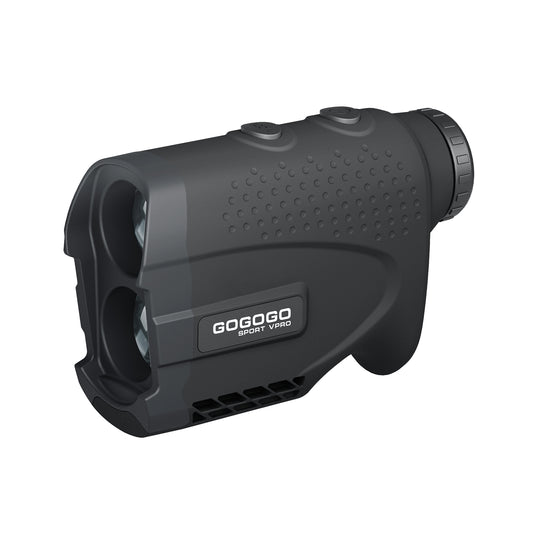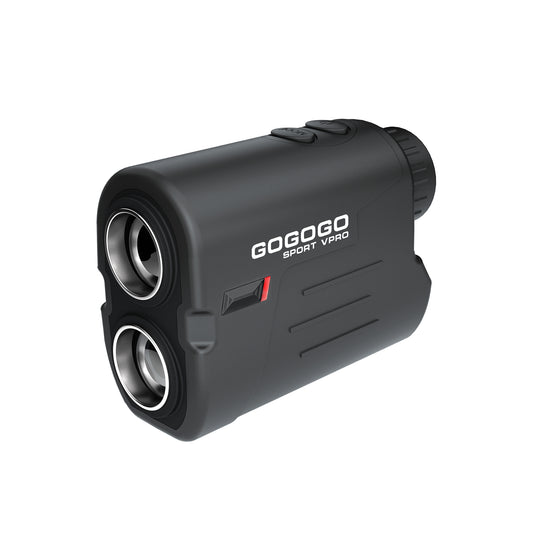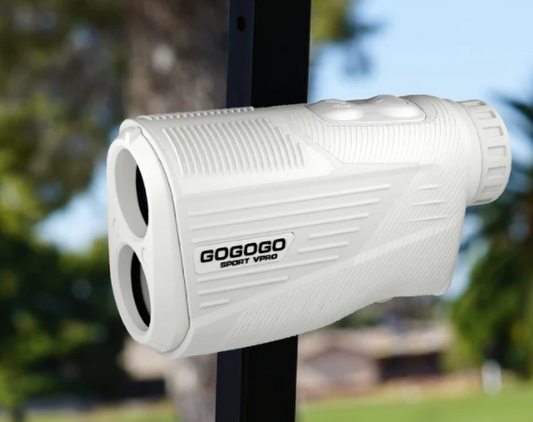Laser rangefinder binoculars have revolutionized hunting by offering precise measurements of distances, enhancing accuracy, and increasing the overall efficiency of a hunt. Whether you are targeting a deer in a dense forest or an elk in the open plains, knowing the exact distance to your target is crucial for making successful shots. In this article, we will explore the range and accuracy of laser rangefinder binoculars, the types of hunting they are best suited for, how to calibrate them and compare different brands to help hunters make an informed decision.

What are the Range and Accuracy of Laser Rangefinder Binoculars?
1. Range of Laser Rangefinder Binoculars
The primary function of laser rangefinder binoculars is to measure the distance to a target. The range typically varies from 600 meters (about 650 yards) to over 1,200 meters (approximately 1,300 yards), with some high-end models can extend this range even further, up to 1500 meters or more. The effective range depends on several factors, including the quality of the laser, the optical system, and environmental conditions. For example, fog, rain, or bright sunlight can affect the ability of the laser to accurately measure distances.
Laser rangefinder binoculars are divided into different classes based on the maximum distance they can measure. For instance:
- Entry-Level Models: These usually offer a range between 400 to 600 meters (437 to 656 yards), which is sufficient for short-range hunting and target practice.
- Mid-Range Models: Typically, these can measure distances between 600 to 800 meters (656 to 874 yards), suitable for most medium-range hunting scenarios.
- Long-Range Models: These rangefinder binoculars can measure distances exceeding 1,000 meters (1,094 yards) and are designed for long-distance shooting, making them ideal for hunting large games at extended distances.
2. Accuracy of Laser Rangefinder Binoculars
Accuracy is critical for a successful shot, especially when hunting in difficult terrain or during low light conditions. The accuracy of hunting rangefinder binoculars is typically within 1 meter (3.3 feet), but this can vary depending on the model and external factors. Most high-quality rangefinder binoculars offer an accuracy range of ± 1 meter (± 3.3 feet), meaning that the laser will return a distance measurement that is within 1 meter of the actual distance. However, this accuracy can decrease as the range increases, especially in low-contrast environments.
Several factors can impact the accuracy of a laser rangefinder, including:
- Environmental conditions: Weather such as rain, fog, or snow can scatter or absorb the laser beam, reducing measurement accuracy.
- Surface reflectivity: The type of target—whether it's a tree, a rock, or an animal—can affect the laser's ability to return a precise measurement.
- Battery life: As the battery depletes, the rangefinder’s power may decrease, potentially impacting both range and accuracy.
In general, smooth, reflective surfaces, like the side of a large animal or a tree, will provide more accurate readings compared to irregular surfaces, such as dense vegetation.

What Types of Hunting Are Laser Rangefinder Binoculars Suitable For?
Laser rangefinder binoculars are versatile tools, suitable for a variety of hunting styles and environments. Here’s a breakdown of the types of hunting they are most effective for:
1. Long-Range Hunting
For hunters who prefer shooting at long distances, such as those engaged in varmint or big-game hunting, laser rangefinder binoculars are indispensable. These binoculars allow hunters to quickly and accurately assess the distance to their target, providing vital information for making precise shots. Without such a tool, estimating distances over long ranges can lead to errors in judgment, potentially resulting in missed opportunities.
2. Low-Light and Dusk/Dawn Hunting
In low-light conditions, such as during dawn or dusk, laser rangefinder binoculars are incredibly useful. The optical enhancements of binoculars, combined with laser technology, help hunters identify targets even when visibility is poor. The ability to measure distances accurately in low-light scenarios is especially crucial for hunters who prefer hunting at times when animals are most active, but natural light is limited.
3. Mountain and Open Terrain Hunting
Hunting in mountainous or open terrain, such as grasslands or deserts, often involves long-range shots, where laser rangefinder binoculars truly shine. These binoculars provide hunters with the ability to measure vast distances quickly and accurately, ensuring they make informed decisions about their shots. The ability to judge the exact distance in these expansive environments is essential to prevent errors in range estimation and improve shooting accuracy.
4. Fast-Moving Game
In the case of fast-moving game, such as birds or large predators, quick and accurate range measurements are essential for a successful hunt. Laser rangefinder binoculars offer quick, responsive readings that allow hunters to track moving targets and adjust their aim accordingly. The ability to rapidly acquire the distance can make all the difference when dealing with a target that is constantly on the move.
How to Calibrate Your Hunting Rangefinder Binoculars
Calibrating laser rangefinder binoculars ensures that the readings you receive are accurate, especially over long distances or in challenging conditions. Here’s a step-by-step guide to calibration:
Why Calibration is Necessary
Laser rangefinder binoculars can experience slight misalignment or internal errors over time, especially after heavy usage. Calibration ensures that the device is still providing accurate distance readings. It also helps compensate for any environmental factors such as temperature changes or battery fluctuations.
Calibration Steps
- Use a Known Distance: The simplest way to calibrate your hunting rangefinder binoculars is to use a known, reliable distance as a reference point. This could be a marker, a post, or any other object whose distance is already known.
- Test the Accuracy: Once you have a reference point, test your rangefinder binoculars by measuring the distance to that object. If the rangefinder’s reading differs from the known distance, adjustments are necessary.
- Adjust Settings: Many rangefinder binoculars allow users to adjust for different distances or even atmospheric conditions. Refer to your user manual for specific instructions on how to adjust the calibration settings.
- Regular Recalibration: After each hunt or when moving to a new hunting location, it’s a good practice to recalibrate your binoculars to ensure their accuracy.
Common Calibration Errors
- Battery Depletion: A low battery can cause fluctuating accuracy. Always ensure that the battery is fully charged or replaced regularly.
- Environmental Changes: Calibration should be checked in various conditions (e.g., temperature or humidity) as these can affect the laser's performance.
Comparing Top Brands of Hunting Rangefinder Binoculars
When choosing the best hunting rangefinder binoculars, it's important to consider the brand's reputation, the specific features each brand offers, and how these features align with your hunting needs. The four brands we’ll examine—Gogogo Sport Vpro, Bushnell, Zeiss, and Leica—each have their own strengths and weaknesses, making them suitable for different types of hunters. Let’s explore each of these brands in detail.

1. Gogogo Sport Vpro
Gogogo Sport Vpro offers an affordable yet reliable rangefinder binocular option for hunters on a budget. As a brand, Gogogo Sport Vpro is relatively new to the market compared to some of its more established competitors, but it has quickly gained attention due to its value-for-money offerings.
Price & Value: The Gogogo Sport Vpro rangefinder binoculars are priced in the budget range, making them an attractive choice for hunters who are just starting out or for those who only hunt sporadically. The lower price does mean you’ll have to compromise slightly on features and performance, but the overall value is still strong for the price point.
Performance:
- Range: The Vpro series generally offers a measurement range from 650 yards to 2500 yards, making them well-suited for short-range to long-range hunting in open fields, forests, or other less-dense environments.
- Accuracy: The accuracy is typically ± 1 yard, which is acceptable for general hunting needs but might fall short in situations requiring pinpoint precision over longer distances.
- Optics: The optics provide decent clarity for most standard uses, but they don't match the high-end optical quality seen in more premium brands. The field of view is wide enough to scan the surroundings, but image clarity can degrade when light conditions are poor.
Pros:
- Affordable, and excellent for beginners or casual hunters.
- Lightweight and easy to use, making them a good choice for hunters who want a simple tool for quick measurements.
- Battery life is solid for its price range.
Cons:
- Limited range, especially when compared to more expensive models. Not suitable for long-range precision shooting.
- Optics are decent but not as crisp as those found in higher-end models.
- Limited feature set—lacks some of the advanced modes available in pricier models (e.g., angle compensation, advanced display options).
Best for: Casual hunters, beginners, or those on a budget who want a basic, functional rangefinder binocular.

2. Bushnell
Bushnell is one of the most well-known brands in the optical device industry, offering a range of high-quality, reliable products. Bushnell rangefinder binoculars are designed to withstand tough conditions and are favored by hunters who need a durable and versatile tool for both medium-range and long-range shooting.
Price & Value: Bushnell offers a variety of models at different price points. The mid-range models typically come with a solid mix of performance and affordability, while their premium models are priced higher but deliver exceptional accuracy, durability, and range.
Performance:
- Range: Bushnell’s rangefinder binoculars, such as the Elite or Legend models, offer impressive ranges that extend up to 1,200 yards. This makes them ideal for both medium and long-range hunting scenarios, especially in open terrain or when you need to make precise distance measurements over greater distances.
- Accuracy: The accuracy of Bushnell’s products typically falls within ± 1 yard, which is excellent for most hunting applications. This level of precision ensures hunters can make well-informed shots even at longer distances.
- Optics: Known for its quality optics, Bushnell’s rangefinder binoculars offer high-quality glass with multi-coated lenses, which provides a crisp, bright image even in low-light conditions. This is a critical feature for hunters who frequently hunt at dawn or dusk.
Pros:
- Excellent durability and build quality. Bushnell binoculars are often weather-resistant and designed to perform in challenging outdoor environments.
- High-quality optics ensure clear, sharp images.
- Reliable rangefinder performance with good range and accuracy.
Cons:
- Bushnell binoculars are generally more expensive than entry-level models, making them less accessible for hunters on a tight budget.
- Some models can be heavier, which may be a drawback for hunters who prioritize portability.
Best for: Serious hunters who need a durable, high-performance rangefinder binocular for medium to long-range hunting.

3. Zeiss
Zeiss is widely regarded as one of the top names in optical equipment, particularly for binoculars. The company is known for its superior craftsmanship, state-of-the-art technology, and high-end optics. Zeiss binoculars are often the go-to choice for professional hunters and those who demand the absolute best.
Price & Value: Zeiss binoculars are on the premium end of the spectrum. Their rangefinder binoculars come with a hefty price tag, but they justify this cost with exceptional optical performance, cutting-edge technology, and advanced features.
Performance:
- Range: Zeiss’s rangefinder binoculars, such as the Victory RF series, offer impressive range capabilities, typically up to 2000 yards. This makes them perfect for long-range shooting in a variety of hunting environments, whether in open terrain or dense forests.
- Accuracy: Zeiss provides extremely precise distance measurements, with accuracy levels within ± 1 yard. The brand’s advanced technology allows for precise readings, even over long distances.
- Optics: Zeiss is renowned for its superior optics. Their binoculars feature high-quality, fully multi-coated lenses, offering brilliant clarity, superior brightness, and a wide field of view, even in low-light conditions. Zeiss’s T coating ensures high light transmission, allowing hunters to see fine details in dim environments.
Pros:
- Exceptional optical clarity and brightness, make them ideal for low-light hunting situations.
- Extremely durable and weather-resistant, designed to withstand harsh outdoor conditions.
- High range and accuracy, suitable for professional and long-range hunters.
Cons:
- The price point is significantly higher than other brands, which might be prohibitive for some hunters.
- Heavier than many other models, which could impact portability for long treks.
Best for: Professional hunters or those who demand the highest level of optical performance and accuracy for long-range hunts in any condition.

4. Leica
Leica is another premium brand that has set a high standard in the optical equipment industry. Known for its high-precision engineering and cutting-edge technology, Leica offers rangefinder binoculars that combine precision, durability, and superior optics in a single package.
Price & Value: Leica’s rangefinder binoculars are among the most expensive on the market, but they offer unmatched performance and reliability. The investment is often justified for serious hunters who require the best equipment available.
Performance:
- Range: Leica’s rangefinder binoculars, like the Geovid series, offer an impressive range is up to 1,500 yards, ideal for precision shooting over long distances in any terrain.
- Accuracy: Leica provides extremely accurate distance readings, often within ± 0.5 meters, making them perfect for hunters who need the highest degree of precision.
- Optics: Leica’s binoculars feature high-definition optics, with fully multi-coated lenses that produce ultra-bright, clear images even in challenging light conditions. Leica uses AquaDura® coatings to protect against dirt and moisture, ensuring the lenses stay clear in the rain, snow, or fog.
Pros:
- Outstanding optical performance with unparalleled clarity and brightness.
- High precision and long-range capabilities make them perfect for professional hunters.
- Extremely durable, with excellent build quality and resistance to harsh weather conditions.
Cons:
- The high cost may not be justified for all hunters, especially those who only hunt occasionally.
- Heavier than some other models, which can be a consideration for those who prioritize lightweight equipment.
Best for: Elite hunters or professionals who need the very best optics, range, and accuracy for long-distance hunts in all types of conditions.
Final Thoughts
Laser rangefinder binoculars are a valuable tool for hunters who demand precision and efficiency in their hunts. By understanding the range, accuracy, and calibration processes of these devices, as well as the specific hunting scenarios in which they excel, hunters can make an informed decision about which binoculars are right for them. Furthermore, comparing top brands like Gogogo Sport Vpro, Bushnell, Zeiss, and Leica helps narrow down choices based on budget and performance needs. Whether you are a beginner or a seasoned professional, the right hunting rangefinder binoculars can significantly improve your chances of success in the field.






![[2025] The Ultimate Guide to Pinseeker Rangefinders for Golfers](http://gogogosport.com/cdn/shop/articles/gogogo_sport_vpro_pinseeker_rangefinder.png?v=1757993796&width=533)